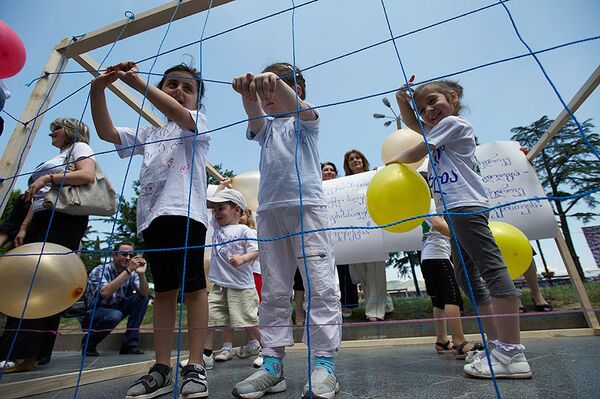Georgian schoolchildren will receive a new history schoolbook on 200 years of Russian occupation by the beginning of the new school year, the Russian Vremya Novostei daily reported on Wednesday.
In April 2010, Georgian President Mikheil Saakashvili created a special commission to investigate debatable aspects of Russian-Georgian historic relations. The commission came up with the idea to publish an "occupation textbook."
The textbook was prepared by the Georgian Foundation for Georgian Studies, Humanities and Social Sciences and will be introduced under a reform to the country's educational system, a Georgian newspaper reported.
Long-standing tensions between Russia and the former Soviet republic of Georgia turned violent during a five-day war in August 2008, when Tbilisi attacked South Ossetia, where most residents are Russian passport holders, in an attempt to bring it back under central control.
After Russia recognized the independence of South Ossetia and other former Georgian republic, Abkhazia, Tbilisi declared the two republics "occupied territories" and severed diplomatic ties with Russia.
However, Saakashvili recently said the country is ready to develop ties with a "modernized Russia."
"We have no interest in confrontation with Russia. We are ready for dialog with them, including the [current] Russian leadership. We recognize them as partners in talks," the Georgian president said in late June.
Professional historians have already split over the "occupation schoolbook" issue. A Georgian historian, Professor Simon Maskharashvili, said the new textbook is important to "debunk the ugly myth that Russia is our friend." If Russia "returns territories" and there is no threat of new armed confrontation, Georgia should renounce the textbook, he said.
On the other hand, Manana Nikolaishvili, head of the Georgian League of Education, noticed that Georgia in the past had already been subjected to Persian, Turkish and Mongolian occupation. If following historic truth, a manual on each of these occupations should be written, not only on recent events, she added.
"The Georgian authorities have no common position on [relations with] Russia: one time they say they want dialogue with Russia, and then they introduce [Russian] occupation studies at schools," another Georgian historian, Zurab Bragvadze, said adding that the move would certainly have a negative impact on bilateral relations.
Russian State Duma Deputy Chairman of the Committee on Information Policy Vladimir Medinsky in an interview to Komsomolskaya Pravda daily slammed the current Georgian history textbooks, emphasizing that their authors misrepresent Russian-Georgian history and distort objective historic facts in favor of the political environment.
Medinsky said that first-grade textbooks cite a state act on Georgia's independence from the Soviet Union on April 9, 1991. The text states that "...in February-March 1921, Soviet Russia occupied the Georgian state through armed aggression and then followed by annexing it."
"Where is the logic? Do they really want to raise a generation that will consider Russia a monster?" Bragvadze queried. "Years later, today's Georgian schoolchildren will have to develop relations with Russia," he noted.
MOSCOW, July 7 (RIA Novosti)


